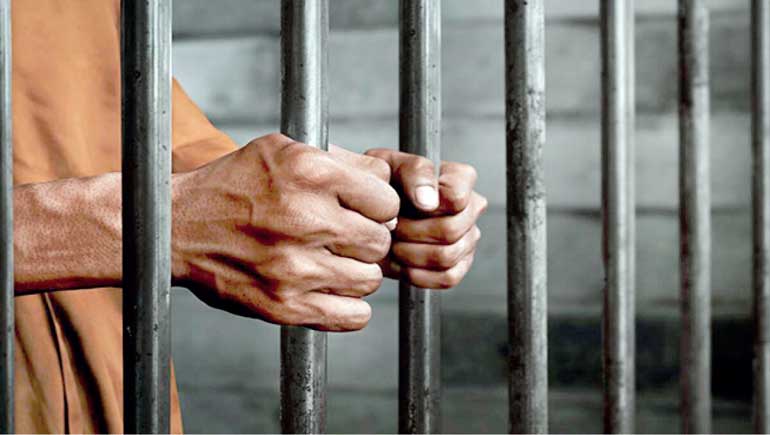Thursday Feb 19, 2026
Thursday Feb 19, 2026
Friday, 26 August 2022 00:10 - - {{hitsCtrl.values.hits}}

DRACONIAN – the Damocles sword of the PTA
The acid test of a ‘National Security Act’ is that it must make the nation more secure. It is the same with a ‘Prevention of Terrorism Act’, in that it must go more than some distance towards preventing acts and incidences of terrorism.
incidences of terrorism.
And more so in the case of Sri Lanka’s Prevention of Terrorism (Provisional) Act of 1979, which preceded all such eventualities, from a 26-year war to insurgencies around the island that reached an apex in the 1987-9 era.
But it is painfully obvious to the common or garden citizen that the PTA failed abysmally to achieve this salutary end. Only a strategic expert with arcane knowledge or esoteric insight would perversely maintain that it was – or is – necessary. At least in the shape and form in which it was known and hated or feared for over 40 years...
That there still are its champions in the realm today speaks volumes for the calibre of society we have become. Perhaps we always were a violently repressive polity, perversely addicted to peace without justice? Maybe hopefully we will grow out of being so backward a people in the years ahead on the road to transforming from a post-war into a post-conflict civilisation.
Afterlife
One of the most telling arguments against the afterlife of such an Act as the PTA of 1979 is the cost to human life and its quality in the four decades that the sword has dangled over the heads of lost generations of Sri Lankan youth.
The number of young persons or youthful older folks who have been arbitrarily arrested, detained, incarcerated, tortured and ‘enforce-disappeared’ is mind-boggling. It must tear at the heart of any society that claims to be civilised.
And as modern as we have become, our island race has yet to grow a compassionate bone for its fellow citizens. As much as we have developed a set of critical teeth that are set on edge these days, and which have snapped at the heels of our oppressive governments of late...
Lapses & lacunae
The PTA of 1979 may have had, in the minds of its champions, many things militating in its favour. But equally challengingly, its lapses and lacunae must get their fair share of air-time in a milieu that is still oppressively militarised.
And given the advent of a National Security Act that is scheduled to replace the draconian PTA, it is an opportune time to consider that latter law’s shortcomings with a view to repealing its spirit and redressing its wrongdoings.
Most importantly, it fails to define ‘terrorism’. From an internationally acceptable perspective, any act of terrorism must have a cause, a result and a purpose. Such acts or intended acts must seek to cause fear; result in death, grievous bodily harm or hostage-taking; and have as its purpose the creation of socio-political instability that is inimical to national security.
Thus the application of the PTA to arrest, detain, relocate and interrogate student activists of the Aragalaya is blatant overkill. It is demonstrably using a sledgehammer to slay a fly, so to speak. Until and unless it is proven that behind the people’s movement to critically engage a regime that has lost its mandate there is a plot to destabilise the government.
And as long as the right to protest peacefully against one’s elected representatives remains both constitutionally guaranteed and a fundamental grant of citizenship, deploying this egregious Act against unarmed civilians remains a violation of our social contract.
The problem is that not only does the PTA as it stands today – and it must fall for all that – permit the arrest and detention of any citizen for up to 90 days without the requirement of being produced before a magistrate.
It also allows a confession made (under duress or torture even, sad to report) to a police officer above or equal to the rank of ASP to be admitted as evidence against the suspect. And the detainee becomes a convict as easily as that. With far-reaching and fundamentally inhumane consequences for his or her family, friends, and associates!
And in this respect, it falls far short of comparable anti-terror laws in more humane, reflective and inclusive commonwealths.
Draconian
Other problematic issues persist with defenders of the PTA. Or yet others who would see its ‘draconian’ – the adjective most associated with it in press reportage and civil society commentary – ethic extended into an afterlife of its own in the newly mooted National Security Act. For one, that it failed to prevent the terrorist attacks of ‘4/21’ – and that despite its dreaded aegis, the alleged mastermind/s of cruellest April’s Easter Sunday attacks are still at large.
For another, that despite the Sri Lankan state’s undertaking to the international community to repeal and repeal it post-haste, the PTA continues to be invoked – as it was in the arrests, detention, translocation and interrogation of three student activists of the Aragalaya/Antharaya who were arrested this week – to stifle dissent.
Last but by no means least: that this one-size-fits-all Damocles’ sword has been held by a hair over the heads of sundry social activists and otherwise innocent dissenters and dissidents by a plethora of governments.
This antidemocratic panoply ranges from authoritarian right-wing governments such as the UNP (1977-1994); left-right coalitions like that of CBK/RW (1994-2004) and MS/RW (2015-19); and militarised regimes in the dark years of the Rajapaksa administrations (2005-15, 2019-2022).
That it has been used similarly by politically diverse governments to hamstring the flower of Sri Lanka’s youthful protestors is not only to our island’s shame in the court of public opinion but its detriment in the corridors of power and justice overseas. Where an international tribune will sit shortly to determine our recent conduct as a democratic – if bankrupt and reduced to begging – republic...
Guarding the guards
It is a painful reality for those who have survived our protracted ‘civil conflict’ – hardly civil and much more than hostilities, conflicting nationalisms – that the PTA survived as long as it did without protecting the people it was meant to safeguard from the vagaries of terrorism and the vicissitudes of violent insurrectionists.
Instead it has been used time and again in heavy-handed ways to wage war on the civilian population. While administration after government after regime has swelled the military arsenals that a peacetime Sri Lanka clearly no longer needs!
It is also evident from the strange and striking disparity between the state’s spend on military materiel compared to its expenditure on education and healthcare among other developmental fundamentals that militarised regimes continue to interpret ‘national security’ mainly as men and machines. When it is obviously our lack of food, forex, fertiliser and pharmaceutical security that has brought a nation to its knees.
Rather than continue to beat our ploughshares into swords then, it is high time that a nation-state experiencing penury like never before asks itself – and answers sensitively and sensibly – some of the hoary questions around national security, even as it moots the eponymous Act.
It is a consummation devoutly to be wished that the freshly minted National Security Act will take a long hard look at the state of a nation desperately in need of fashioning modern ploughshares out of ancient swords, and go soft on the sabre rattling against its own citizens.
The erstwhile clarion call of a conscientised civil society was only recently #GotaGoHome. Maybe its new cry in the pursuit of peace with justice could well be “The PTA must go!” Perhaps we would do truly well as a nascent civilisation if the replacement NSA is not – like Ranil now, as Gota was then – more of the same...
For there is an awkward and awful sense around the nation state these days that ‘the more something changes, the more it stays the same’...
| Editor-at-large of LMD |